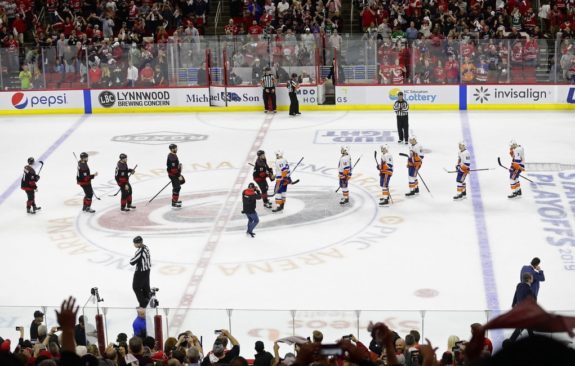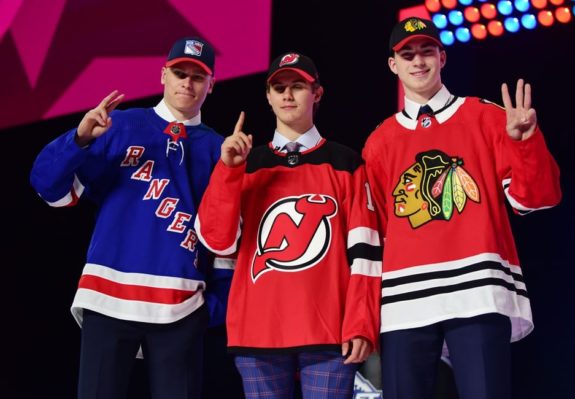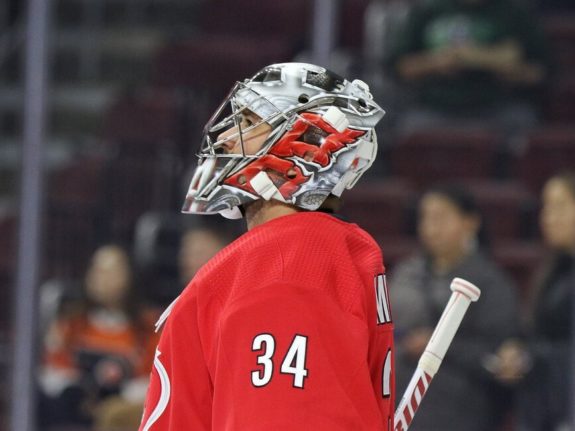It’s no secret the Carolina Hurricanes are on the rise, having made a shocking run to the Eastern Conference Final last season. But can they continue that success and fight for the division championship this season, or will they fizzle out like they did against the Boston Bruins?
The Metropolitan Division teams were among the most active during the summer, which only makes the path to the top more difficult for Carolina. But despite the flurry of moves made by their divisional rivals, the Hurricanes have kept pace, bringing in assets of their own. And in his short time as general manager Don Waddell has turned the Hurricanes into a serious Stanley Cup contender.
Riding the Momentum
The Hurricanes are perennial underdogs, and that was no different last season. Written off after a horrendous start, the Hurricanes turned a page after the new year and finally started to string some wins together. From Jan. 1 to the end of the regular season, the Hurricanes went on a 30-12-4 run to defy all odds and snag a wild card spot. That momentum carried into the playoffs as well, where they knocked off the defending Stanley Cup champion Washington Capitals and swept the New York Islanders directly after.

So was that simply a hot streak or a sign of things to come? Carolina’s excellent possession numbers the past few seasons always indicated they were on the cusp of success. They’ve already assembled one of the best collections of defensemen in the NHL, but over the summer, they have also taken steps to improve their offense and goaltending – two areas in which they’ve shown weakness in the past. And although they’re going to have to cope with the losses of Micheal Ferland, Calvin de Haan, and Justin Williams, they’ve pieced together an even better team over the summer and look to continue on their upward trend.
The Top Dogs of the Metro
Of the four Metropolitan Division teams that made the playoffs last season, it’s the Hurricanes who made the biggest improvements. Newcomers Ryan Dzingel and Erik Haula add two solid 50-point threats to their forward core, and Jake Gardiner, who was signed by the Hurricanes on Sept. 6, gives them yet another weapon from the blue line. The biggest improvements may come from within, however. Andrei Svechnikov, the second-overall pick in 2018, is expecting a big second year after scoring 20 goals in his rookie season. Meanwhile, Carolina’s leading scorers, Sebastian Aho (83 points) and Teuvo Teravainen (76 points), look to repeat their career seasons.
The cores for the Washington Capitals, New York Islanders and Pittsburgh Penguins stayed largely the same. The Capitals downgraded Matt Niskanen to Radko Gudas because of cap constraints, the Penguins gained Alex Galchenyuk, but lost Phil Kessel to the Arizona Coyotes, and the Islanders went from Vezina Trophy nominee Robin Lehner to Semyon Varlamov, a 31-year-old goalie who has had notable struggles with injuries and consistency the past three seasons.
Another important thing to consider is the direction in which the Capitals and Penguins are trending. Washington’s point totals have gone down each of the past four seasons (120, 118, 105, 104). It’s a similar story for the Penguins, who since winning the cup in 2016 and 2017, have suffered two early playoff exits – most recently a four-game sweep in the first round at the hands of the Islanders.
Last season, the Hurricanes were the youngest team in the NHL, at an average age of 25.7, while the Capitals (27.9) and Penguins (28.5) were among the league’s oldest. Sidney Crosby and Alex Ovechkin are creeping into their mid-30s, so it’s only a matter of time before the Penguins and Capitals start to regress – similar to the way the Chicago Blackhawks and Los Angeles Kings have.
A Shuffle in the Metro?
While the established Metropolitan teams have their eyes set on each other, two underbelly teams could be plotting an uprising. The New Jersey Devils and New York Rangers were some of the busiest of all NHL teams this summer and both made massive improvements in all areas. The Devils scored the first-overall pick in the 2019 Draft, which they used on center Jack Hughes. They also added key players in P.K. Subban, Wayne Simmonds and Nikita Gusev. The Rangers, who had the second-overall pick, took winger Kaapo Kakko, and also flexed their financial muscles by signing Artemi Panarin and Jacob Trouba to mammoth contracts.

While it’s undoubtable the two clubs got significantly better, can they really turn things around that quickly? It may take time to build team chemistry – and there are red flags that still exist. The Devils’ goaltending situation is somewhat delicate, with questions about Cory Schneider’s health and consistency, as well as 22-year-old Mackenzie Blackwood’s readiness. In New York, the Rangers will have several rookies taking on full-time NHL roles in front of 37-year-old goaltender Henrik Lundqvist, who is coming off the statistically worst season of his career.
The Rangers and Devils are two teams a lot of people will be watching this season – they could even challenge the top Metropolitan Division teams for those important playoff spots. They’ve gone from bad to good with all the changes they’ve made, the only problem is that in that time, the Hurricanes have gone from good to great.
Expectations are low for the final two teams that round out the Metropolitan Division. After losing their top three players to free agency, the crippled Columbus Blue Jackets are going to be tested this season. And in Philadelphia, the Flyers are desperately trying to find a way to crawl back into the playoff picture, but have made few significant changes to their core. Is a full season of Carter Hart and the arrival of Kevin Hayes enough to turn the franchise around?
How Can Hurricanes Win Division?
We know Carolina’s defense is really good. And maybe once GM Waddell flips Justin Faulk for another goal scorer, their offense will be great too. But this is the season goaltender Petr Mrazek must finally cement himself as the starter. After signing a two-year, $6.25-million contract to return to Carolina, he will be looking to build on a successful season and really take the reins for the Hurricanes. In a division with shaky goaltending across the board (Braden Holtby the exception), he has every opportunity to stand out and put the team on his back.

We all know winning games against divisional teams is crucial. Last season, Carolina was 13-13-2 against Metropolitan teams and 33-16-5 against the rest of the league. That poor divisional record was part of what contributed to the five points that separated the Hurricanes from the division-leading Capitals last season.
To take over the division, the Hurricanes must play to their greatest strength – defense. Carolina’s blue line has a good mix of sword and shield – offensively threatening players like Faulk, Gardiner, and Dougie Hamilton, and defensive stalwarts in Jaccob Slavin and Brett Pesce. Strong in depth and deep in talent, Carolina’s blue line is second to none compared to its divisional opponents. With the addition of a solid backup goalie in James Reimer as well, scoring goals against the Hurricanes won’t be easy.
Offensively, Carolina’s stars may never come close to achieving what Crosby and Ovechkin have done in their careers, but in order to win the division, players like Aho, Teravainen, and Nino Niederreiter will have to compete with them. Last season Ovechkin dismantled the Hurricanes, scoring four goals and six points in four regular season games, and nine points in seven playoff games against Carolina. Since containing Ovechkin is next to impossible, Carolina’s top scorers must approach those games with the same kind of bite to be successful.
In their 21-season history, only once have the Hurricanes made the playoffs in back-to-back seasons. But this time, their division is wide open, and this youthful and energetic Hurricanes squad may have what it takes to rise to the top and surprise everybody once again.